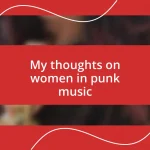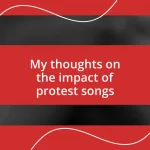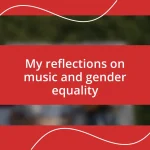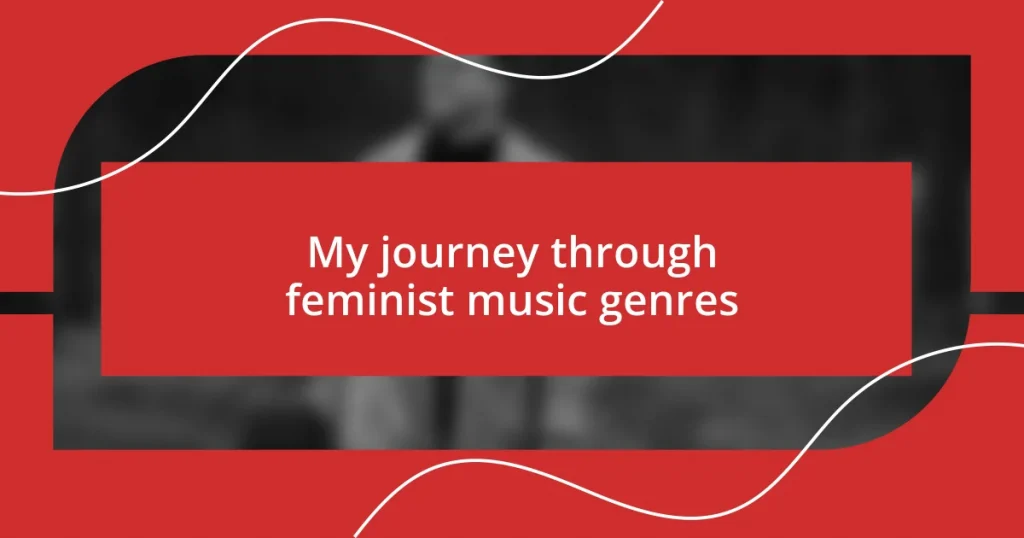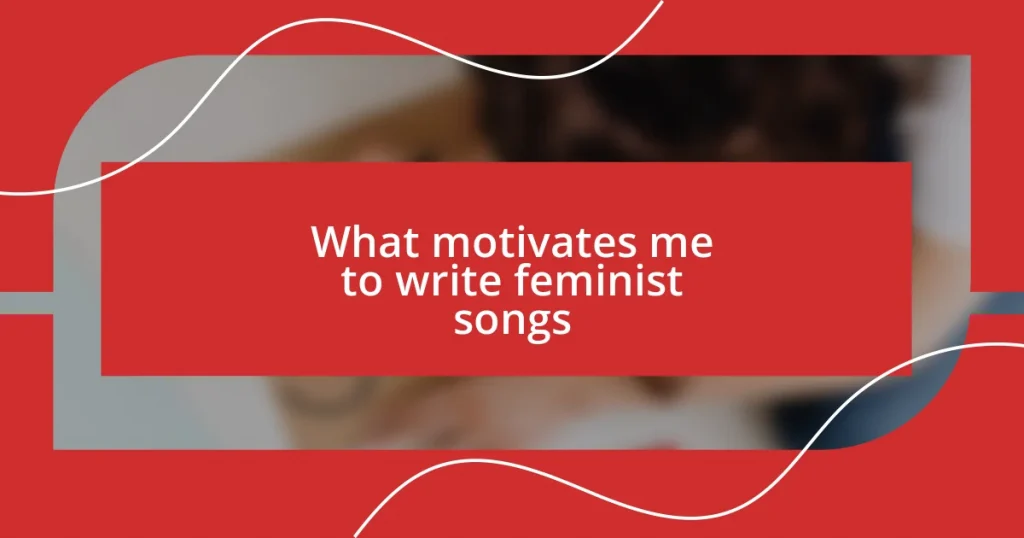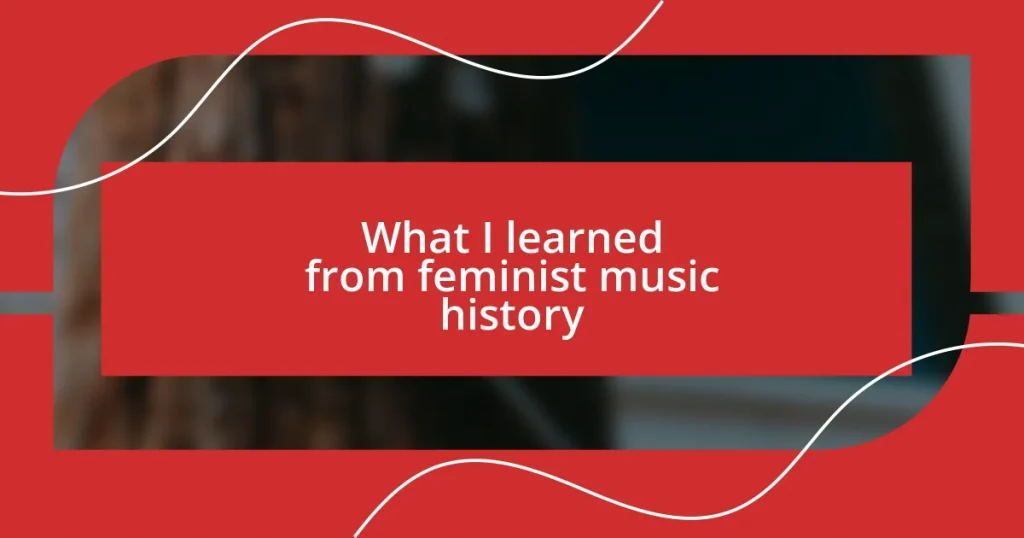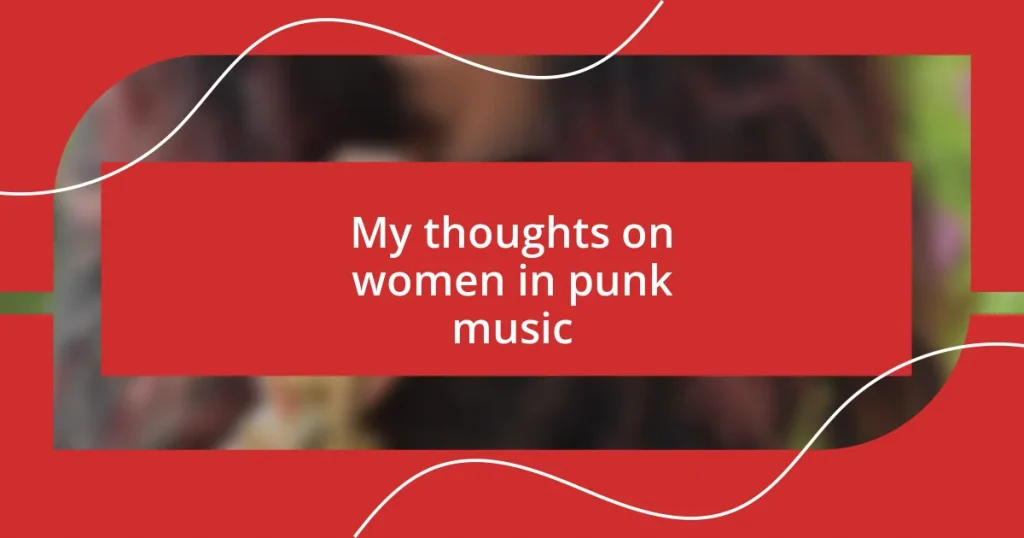Key takeaways:
- Feminist music has evolved significantly, inspired by movements like the Women’s Liberation Movement of the 1960s-70s and the Riot Grrrl movement of the 1990s, fostering genres that empower women and challenge societal norms.
- Key artists such as Joan Baez, Patti Smith, and Beyoncé have shaped feminist music, using their platforms to advocate for gender equality and social change.
- Contemporary feminist music embraces intersectionality and mental health, with collaborations among diverse artists creating a broader dialogue around empowerment and resilience.
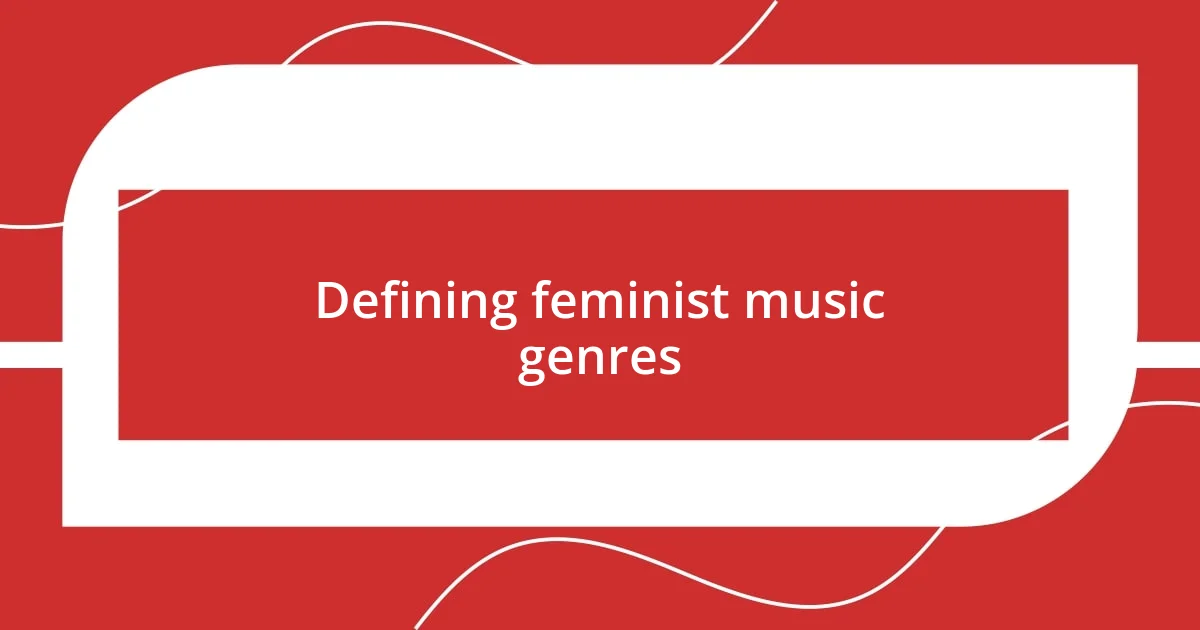
Defining feminist music genres
Feminist music genres can be defined by their emphasis on gender equality and the celebration of women’s experiences and voices. When I listen to songs that challenge societal norms, I can’t help but feel a sense of empowerment. Is there anything more uplifting than hearing lyrics that not only reflect my challenges but also inspire a collective strength among listeners?
Within these genres, you’ll often find artists who use their platform to challenge patriarchy, express personal narratives, and foster community among women and marginalized groups. One of my favorite moments was attending a concert where the singer urged the audience to embrace their individuality. The energy was palpable, and it felt like we were all part of something transformative.
Moreover, feminist music genres serve as a critical space for dialogue about gender issues, identity, and social justice. I remember sharing a playlist with friends that sparked conversations around feminism, race, and sexuality – it was eye-opening to hear diverse perspectives on tracks that meant so much to us. Doesn’t it make you think about how music can be a powerful tool for change?
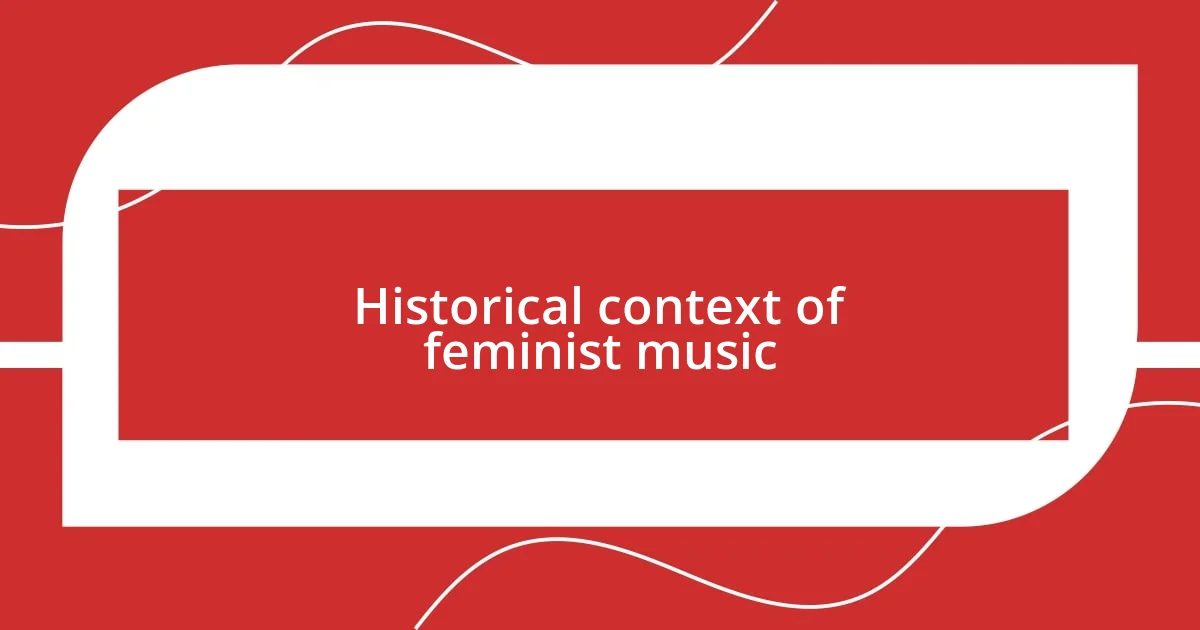
Historical context of feminist music
Throughout history, feminist music has evolved as a response to societal shifts and the fight for gender equality. I remember hearing about the Women’s Liberation Movement of the 1960s and 70s, which fueled artists like Joan Baez and Patti Smith to create music that resonated with the struggles of women. It’s fascinating to see how these artists not only challenged existing norms but also laid the groundwork for future generations of female musicians.
As we moved into the 1990s, the Riot Grrrl movement emerged, combining punk rock energy with feminist ideology. I can almost feel the raw intensity of those garage band anthems that spoke directly to a generation of young women craving self-expression and empowerment. Songs became manifestos, urging listeners to reclaim their identities and question societal expectations. It’s incredible how music can encapsulate the spirit of a movement, like a rallying cry for change.
Today, the legacy of feminist music continues to flourish across genres, connecting artists and audiences in powerful ways. I often find myself reflecting on how contemporary musicians, from Beyoncé to Billie Eilish, carry the torch of their predecessors, using their voices to advocate for equality and social change. This ongoing dialogue through music fascinates me; it confirms that the fight for women’s voices is far from over and that music, as an art form, is always a crucial part of this journey.
| Era | Key Developments |
|---|---|
| 1960s-70s | Women’s Liberation Movement inspires artists like Joan Baez and Patti Smith. |
| 1990s | Riot Grrrl movement harnesses punk rock energy to empower young women. |
| Today | Contemporary artists, including Beyoncé and Billie Eilish, continue advocating for gender equality. |
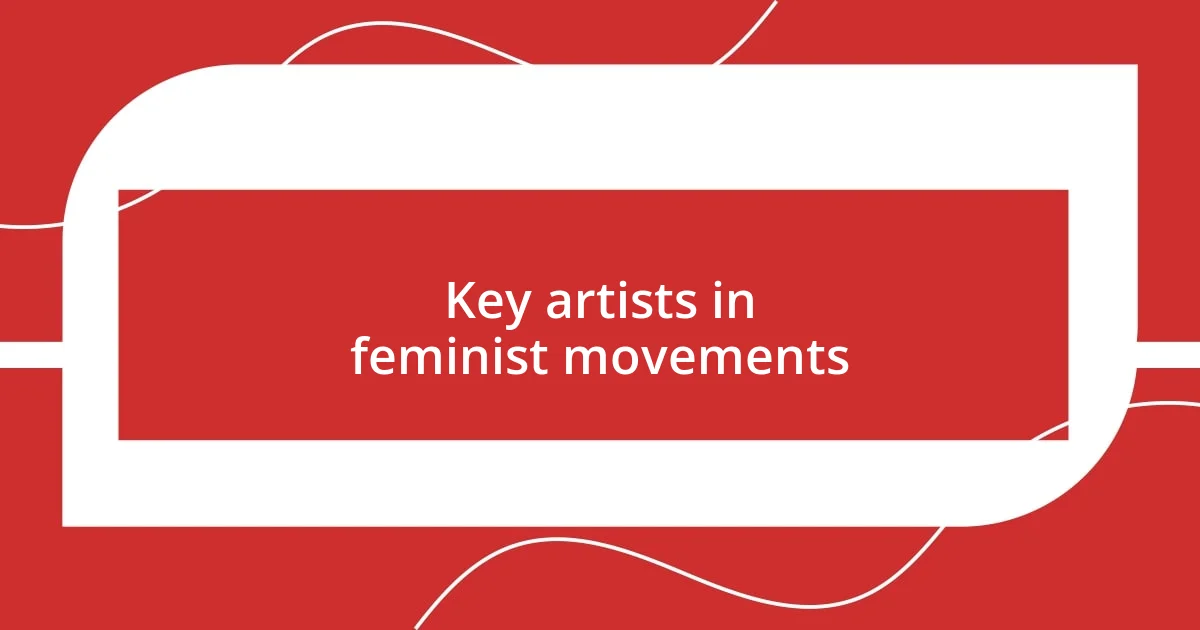
Key artists in feminist movements
While exploring key artists in feminist movements, it’s impossible to overlook how these musicians have shaped the landscape. For me, artists like Ani DiFranco have always stood out; her raw, poetic lyrics resonate deeply. I fondly recall sitting in my college dorm, listening to her songs that spoke directly to the struggles of being a woman in a world that often feels unwelcoming. Her commitment to independence and empowerment has inspired generations of listeners to express their fierce authenticity.
Another significant figure is Lilith Fair founder Sarah McLachlan, who created a platform for female artists to showcase their talent. I vividly remember attending a Lilith Fair concert; the atmosphere was electric, filled with women celebrating each other’s artistry and stories. It was a reminder that women do not need to compete but can thrive in collaboration. Here’s a quick list of some key artists who have made a mark in feminist movements:
- Joan Baez: A trailblazer in folk music and activism during the 1960s.
- Patti Smith: Blended punk rock with feminist messages, influencing a generation.
- Ani DiFranco: Known for her fiercely independent spirit and lyrics advocating for women’s rights.
- Sarah McLachlan: Created Lilith Fair, elevating the visibility of female musicians.
- Beyoncé: Continues to use her platform to address feminism, empowerment, and race.
These artists not only contribute to musical evolution but also serve as catalysts for social change, encouraging all of us to find our voices.
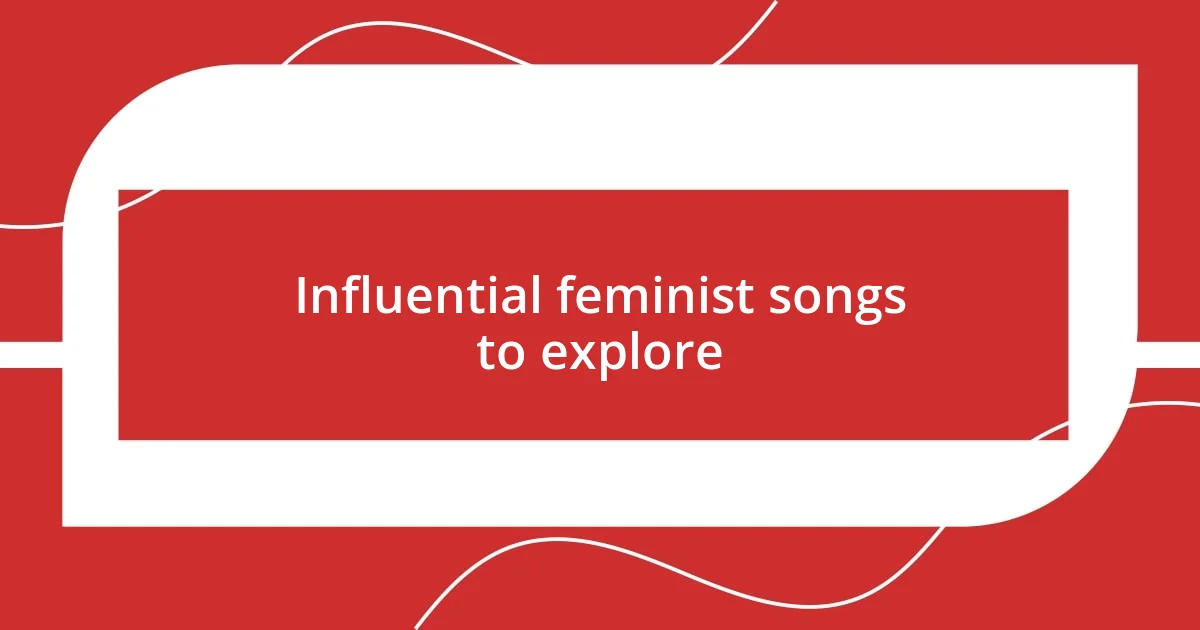
Influential feminist songs to explore
One of the most stirring feminist songs that resonates with many is “You Don’t Own Me” by Lesley Gore. I recall the first time I heard it—its empowering lyrics spoke directly to my sense of independence. It wasn’t just about a relationship; it was a bold declaration of autonomy, challenging societal expectations that often seek to define or confine women’s choices. Listening to it feels like an invitation to stand up and refuse the pressure to conform.
Another powerful anthem is “Rebel Girl” by Bikini Kill, which remains a personal favorite. This song has a way of igniting a fire in my belly, calling forth that rebellious spirit in every woman. How many songs dare to champion friendship among women as much as individuality? It’s a vivid reminder of the importance of solidarity, and I often find myself humming its chorus during moments when self-doubt creeps in, encouraging me to embrace my uniqueness.
Then there’s “Formation” by Beyoncé, a contemporary masterpiece that blends personal and political empowerment. I remember watching the music video and feeling a mixture of pride and inspiration. It challenges listeners to celebrate their identity while addressing broader social injustices, creating a space where women—especially women of color—can reclaim their narratives. This song serves not just as an anthem but as a powerful reminder of the ongoing journey toward equality, and I often wonder: how can we use music today to amplify our voices even further?
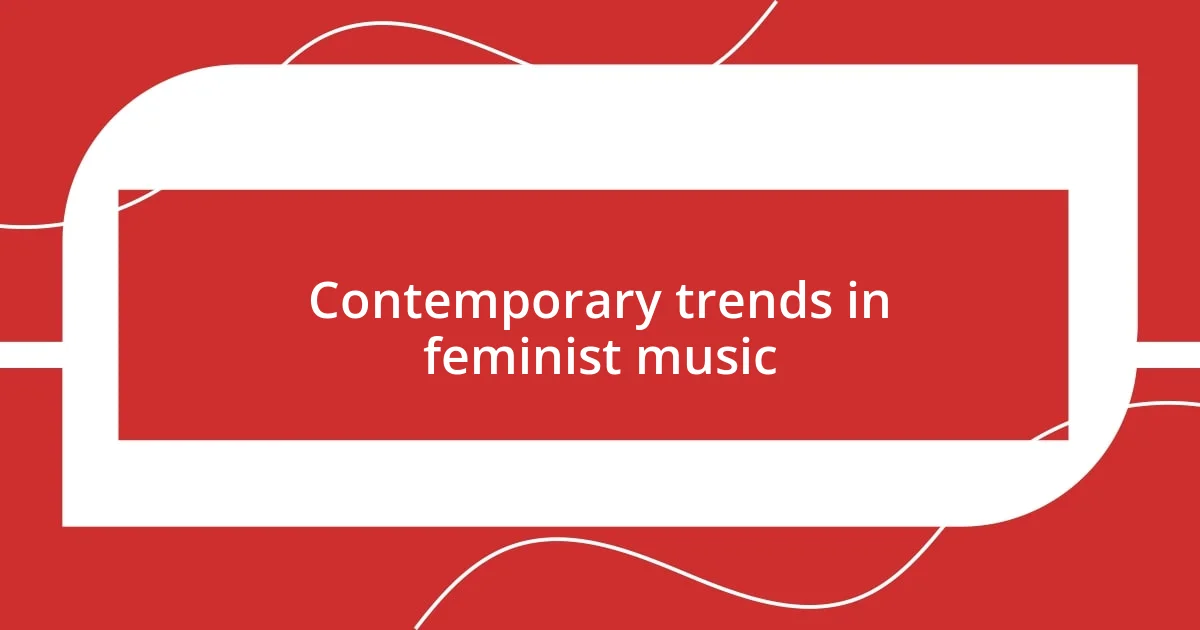
Contemporary trends in feminist music
The contemporary feminist music scene is vibrant and diverse, reflecting an array of voices and experiences. Artists today are increasingly using their platforms to address issues like intersectionality and mental health, creating music that resonates on several levels. I can’t help but think about how empowering it is to see musicians like Halsey, whose candid discussions about identity and mental health have struck a chord with many, including myself. Isn’t it refreshing to find songs that validate personal struggles while simultaneously celebrating resilience?
Moreover, the rise of digital platforms has democratized music production, allowing emerging female artists to share their messages without traditional gatekeeping. When I stumbled upon a small artist on social media, pouring out her feelings through lyrics about her struggles and triumphs, it was a stark reminder of the power of grassroots movements. How many voices go unheard because of the lack of access to mainstream media? It’s heartening to see that more women are taking charge of their narratives, finding strength in vulnerability and forging communities that uplift one another.
In this current landscape, collaborations between artists across genres and backgrounds also signify a key trend in feminist music. For example, when I heard the collaboration between Lizzo and Cardi B on “Rumors,” it felt like a celebration of unapologetic self-love and empowerment. How often do we witness artists coming together to celebrate shared values? The synergy not only amplifies their messages but also creates a wider dialogue around feminism, pushing the boundaries of what empowerment means today.


